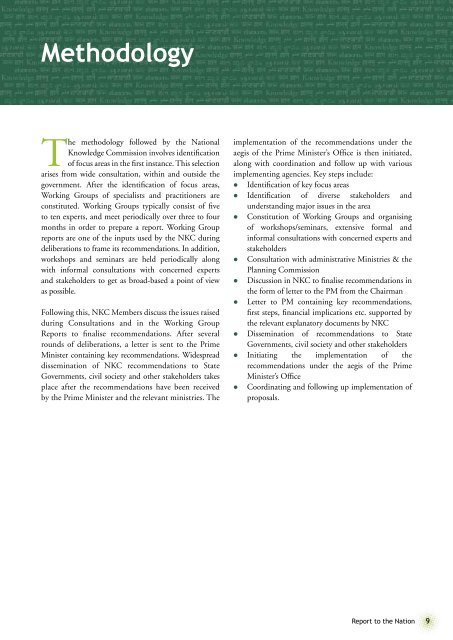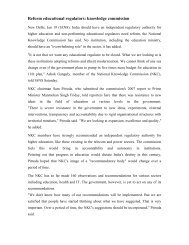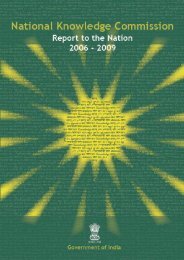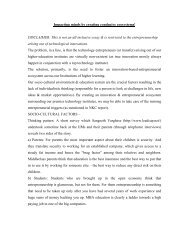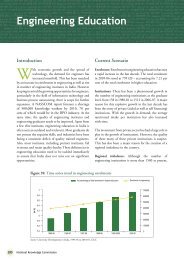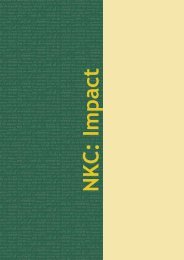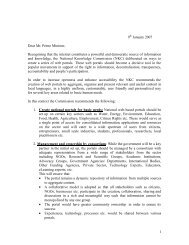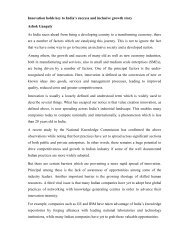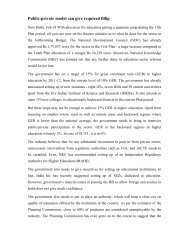National Knowledge Commission Report to the Nation 2009: Overview
National Knowledge Commission Report to the Nation 2009: Overview
National Knowledge Commission Report to the Nation 2009: Overview
You also want an ePaper? Increase the reach of your titles
YUMPU automatically turns print PDFs into web optimized ePapers that Google loves.
Methodology<br />
The methodology followed by <strong>the</strong> <strong><strong>Nation</strong>al</strong><br />
<strong>Knowledge</strong> <strong>Commission</strong> involves identification<br />
of focus areas in <strong>the</strong> first instance. This selection<br />
arises from wide consultation, within and outside <strong>the</strong><br />
government. After <strong>the</strong> identification of focus areas,<br />
Working Groups of specialists and practitioners are<br />
constituted. Working Groups typically consist of five<br />
<strong>to</strong> ten experts, and meet periodically over three <strong>to</strong> four<br />
months in order <strong>to</strong> prepare a report. Working Group<br />
reports are one of <strong>the</strong> inputs used by <strong>the</strong> NKC during<br />
deliberations <strong>to</strong> frame its recommendations. In addition,<br />
workshops and seminars are held periodically along<br />
with informal consultations with concerned experts<br />
and stakeholders <strong>to</strong> get as broad-based a point of view<br />
as possible.<br />
Following this, NKC Members discuss <strong>the</strong> issues raised<br />
during Consultations and in <strong>the</strong> Working Group<br />
<strong>Report</strong>s <strong>to</strong> finalise recommendations. After several<br />
rounds of deliberations, a letter is sent <strong>to</strong> <strong>the</strong> Prime<br />
Minister containing key recommendations. Widespread<br />
dissemination of NKC recommendations <strong>to</strong> State<br />
Governments, civil society and o<strong>the</strong>r stakeholders takes<br />
place after <strong>the</strong> recommendations have been received<br />
by <strong>the</strong> Prime Minister and <strong>the</strong> relevant ministries. The<br />
implementation of <strong>the</strong> recommendations under <strong>the</strong><br />
aegis of <strong>the</strong> Prime Minister’s Office is <strong>the</strong>n initiated,<br />
along with coordination and follow up with various<br />
implementing agencies. Key steps include:<br />
• Identification of key focus areas<br />
• Identification of diverse stakeholders and<br />
understanding major issues in <strong>the</strong> area<br />
• Constitution of Working Groups and organising<br />
of workshops/seminars, extensive formal and<br />
informal consultations with concerned experts and<br />
stakeholders<br />
• Consultation with administrative Ministries & <strong>the</strong><br />
Planning <strong>Commission</strong><br />
• Discussion in NKC <strong>to</strong> finalise recommendations in<br />
<strong>the</strong> form of letter <strong>to</strong> <strong>the</strong> PM from <strong>the</strong> Chairman<br />
• Letter <strong>to</strong> PM containing key recommendations,<br />
first steps, financial implications etc. supported by<br />
<strong>the</strong> relevant explana<strong>to</strong>ry documents by NKC<br />
• Dissemination of recommendations <strong>to</strong> State<br />
Governments, civil society and o<strong>the</strong>r stakeholders<br />
• Initiating <strong>the</strong> implementation of <strong>the</strong><br />
recommendations under <strong>the</strong> aegis of <strong>the</strong> Prime<br />
Minister’s Office<br />
• Coordinating and following up implementation of<br />
proposals.<br />
<strong>Report</strong> <strong>to</strong> <strong>the</strong> <strong>Nation</strong><br />
9


